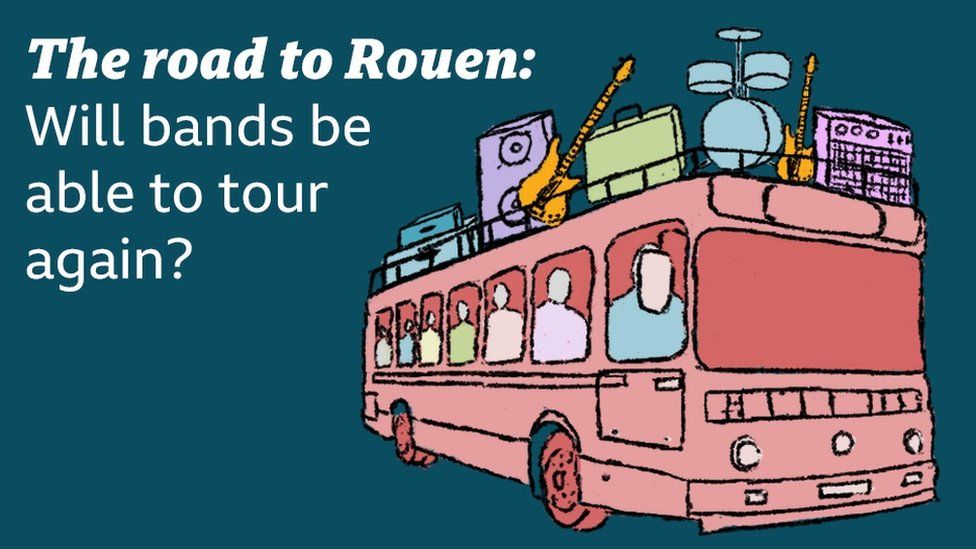BBC News 6 August 2021 - by Chi Chi Izundu
In a hotel room in the French village of Villers sur-mer, Normandy, four members of Tankus the Henge are crammed on a bed in a non-descript hotel room.
"We're pretty tired, but we're enjoying our tour - finally," beams lead singer Jaz Delorean.
This French tour has been 14 months in the planning, after it was cancelled last year thanks to the pandemic. But now they are finally in France, gigging.
But there's no time to rest. Their plan for the day, after this interview, is driving for six hours to Nantes, where they'll set up for their show, because they couldn't afford to bring crew or a driver.
'It just isn't sustainable'
The tour in France started out as 15 days, but they had to cancel five because of quarantine and some people testing positive for coronavirus.
"Money is not our compass, but we have to make some," Delorean says. "Playing music is our compass, but if it doesn't add up we can't consider it. And we used to be able to.
"Imagine your job doesn't exist for half of the year. It's pretty serious."
The band were planning a five-date tour in Germany later this year, but have had to cancel it because "it just isn't sustainable".
"Some of us do have normal people jobs, because we've been forced to for the last year. We have to keep them. It's the reality now.
"We've been working on these German dates for over a year now, and to lose them at the 11th hour is extremely frustrating," the singer says.
Over the next few months, BBC News will be following tour managers as they try to plan their tour dates for 2021 and 2022, to learn more about the obstacles, bottlenecks and successes.
"As we were only touring France, which does not require an expensive visa, the additional costs were mainly the carnet [a travel document needed for instruments and equipment], the insurance and an extra night of accommodation due to the time it took to travel. It added approximately £1,500.
"In addition to this, we estimate we've lost out on £2,500 worth of merchandise sales, because the new Brexit rules mean we cannot take merchandise unless we VAT register and pay duty on every item, which we can't afford to do either. So as an estimate, the tour is £4,000 down."
Tankus the Henge's experiences illustrate the difficulties for British performers in the age of Covid and Brexit. They are among the many bands calling on the government to make touring easier after the UK's departure from the EU led to extra red tape and new fees in some countries.
Earlier this year, hundreds of artists including Radiohead and Biffy Clyro called on the government to strike a deal to prevent "the collapse of the industry".
Earlier this week, the Department for Digital, Culture, Media and Sport (DCMS) announced that UK artists and crew members can travel visa and work permit free for short term touring in 19 of the 27 EU member states.
The announcement wasn't that new, because back in May they said that was the case in 17 countries - so two more have now been added to the list.
On Thursday, Sir Elton John, who has been one of the most vocal artists about the issue, responded by saying the latest announcement "seems to be just a rehash of what we already know".
"There needs to be far more clarity on exactly what progress has been made," the star added, warning that "we risk losing future generations of world beating talent".
Trade body Live music Industry Venues & Entertainment (Live), which is part of the government's working group, agreed there was "nothing new" in the announcement.
Live chief executive Greg Parmley said they were "grateful for the government for clarifying the pre-existing arrangements on travel to a number of EU countries" but "we are still some way from visa-free travel in the EU".
He added: "There are no new 'frictionless' agreements and in reality, this is only a very small piece in a much bigger touring puzzle, and substantial financial and bureaucratic barriers remain that disproportionately disadvantage smaller and emerging artists."
The DCMS said its agreements with the 19 EU member states were reciprocal, so performers and crews can travel for up to three months visa-free. The 19 countries include Germany, Italy, France, Ireland and the Czech Republic.
But the lucrative markets of Spain and Portugal, along with six other territories, are still being negotiated, according to the DCMS. Spain is one of the top five EU destinations for touring UK artists.
And much is still unclear. The government said in June that artists wouldn't need a carnet when travelling with their instruments.
However, the advice is now that those traveling with instruments, equipment and merchandise may need the document.
'27 different sets of rules'
Jamie Njoku-Goodwin, head of industry body UK Music, welcomed the government's announcement, but that was tinged with caution. For example, he doesn't feel like there is clarity on what "short term touring" means.
"We've gone from having the same set of rules working across the EU to now having to operate across essentially 27 different sets of rules and regulations," he told BBC Radio 4's Front Row.
"So there might be some [countries] that you can be doing things for a certain number of days [and] others you can be doing things a little bit longer. But having that clarity for musicians and crews and for the wider sector about how long they can go to places and what will be needed is obviously very important.
"While it's good to know that you can be doing short-term touring in those 19, it also means there are eight which are much more difficult and you're going to need those work permits and visas."
A DCMS spokesperson said: "We have worked at pace to ensure that performers and other creative professionals are able to tour abroad easily and have confirmed visa-free entry for short-term tours in 19 EU Member States, including France, Germany, and the Netherlands.
"We are now working with the remaining countries to encourage them to match the UK's generous arrangements, which allow creative professionals to tour here easily."
Trucking rules 'impossible'
There are other obstacles. Mr Njoku-Goodwin said cabotage rules, which say trucks are only allowed three stops within the EU in seven days before having to return to the UK, is also a problem.
"Its just as big an issue as the visa and work permit issue for many musicians and many companies," he said.
"We're being told that essentially if you're wanting to move equipment through more than two or three countries, or do more than two or three stops, it becomes illegal. That's one thing for a haulier who's going from A to B and then back to A, but for a musician and for a band or orchestra who is wanting to go to multiple locations, it just makes tours actually impossible.
"It's really welcome that government are engaging with this and its moving forward on this, but its really important that we do this as a package."
Biffy Clyro's tour manager Neil Anderson says: "I have had about 12 other bands and managers asking me for bits of insight.
"A couple of folk have asked me if I can literally jot down an overview for tour managers who have never dealt with a carnet, for all the little pitfalls that they need to look out for, how they create it and have it raised in the first place and the protocol of having it checked in and out of each country."
However, the ever-changing landscape of the pandemic has forced the chart-topping rock band to postpone their four-week European tour until next year, and Mr Anderson says a lack of "clarity" of the post-Brexit rules is also a worry.
"We just figured it made a bit more sense to just push everything back to a point whereby we'll hopefully be able to go into it with our eyes fully open."




